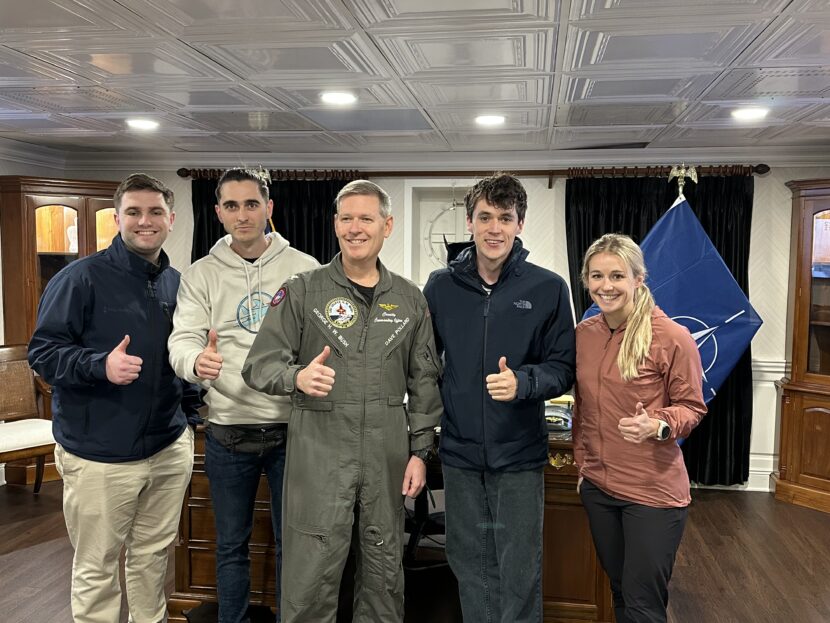How a Climate Activist Ended up on a US Carrier under NATO Control
How did I, a ski mountaineer and climate activist, end up on a US Carrier in the middle of the Adriatic Sea with NATO, watching F-18s take off and land from a flight deck?
When I first received the invitation, I thought it wasn’t a fit, that it was too “off brand.” I sent it to my 91-year-old dad, someone whom I deeply trust about political issues. He told me to stop whatever I was doing, to get home and get my application in right now.
Less than two weeks later, in October 2022, I flew to Italy to meet up with a small group of creators from around the world. Together, we got into a dark cargo plane and flew to an undisclosed location in the sea. As we sat on that flight in life jackets, and helmets with double ear protection, I wondered what path in life had led me here. Was I on the right path? I had to trust my intuition, which told me to come and learn.
When it was time to land on the 300ft/91m runway, we decelerated from 150mph/241kmh to 0, a complete stop, in 2 seconds, pulling almost 5Gs. To land on such a condensed runway, the plane drops a hook, a “tail hook,” which catches an arrestor wire so we don’t end up in the sea. We exited from the rear garage of the cargo plane into a hectic, noisy and high-risk environment. One of the creators measured the decibel level at 130, which is louder than a thunderclap. A decibel level of 150 causes eardrums to rupture. While on the flight deck, I experienced wind from a jet blast that literally pulled me off my feet. My ears were still ringing 24 hours later.
While I was onboard the aircraft carrier USS George H.W. Bush (CVN 77), I was able to observe an operation that requires complex coordination with thousands of people across over a dozen NATO countries . As part of NATO training exercise, “Neptune Strike,” 90 planes a day train to integrate to militaries all over Europe. The highly specialized teams are providing reassurance and deterrence to prove the power and cohesion of the NATO alliance.
I learned that the average age of the 5000 person crew is 22, and over 20% of the crew are women, one of the highest percentages in the military. Almost 75% of the crew had never deployed before.
After watching the action on the flight deck, I left all my electronic devices (including my smartwatch behind) because I went to visit the combat direction center and the carrier air traffic control, where they monitor the air and sea and keep tabs on all the planes in the air. There, I spoke to Sarah Faber, a helicopter pilot, and other women in leadership. I asked them for tips for success as women in male-dominated environments. They told me the military allows them to be direct in how they speak to their male-colleagues. We also shared how important it is to have male allies to make advances in gender equity.
After visiting the combat center, I went to the bridge of the carrier where I learned how to steer the boat with 5000 people on board, instructed by another woman, Alexandra Mooney, or Allie, as she goes by. Allie left her job as a lawyer to join the navy because she wanted a life of action. Steering the carrier was a moment I’ll never forget, and was probably the highlight of my day!
As I’ve grown as an activist, I’ve learned that social and environmental issues are interlinked and that democracies, as we have in the US, while not perfect, are precious forms of governance, because people are free to be the best versions of themselves. I’ve realized that being able to dream about climbing mountains, gender equality and climate action are all functions of living in a free society.
I’m curious about the mountains, the environment and my own limits – to see what is over the next ridge or just how high I can climb and ski. Something that I love about the mountains is the cultural challenge.
Mountains are ruled by forces greater than us – weather, snow, ice, wind and geopolitical forces. Where we can go and what mountains we can climb – that is all dictated by global policy. When I travel, I do extensive research. I become obsessed with the projects I choose.
Given the opportunity, I went to visit the carrier because I am a naturally curious person and because I consider learning and understanding about defense as part of my civic duty.
I’ve been to places in the world where people aren’t allowed to criticize their government, women don’t have basic freedoms and persecuted groups aren’t able to get passports to ever leave the country. Living under an authoritarian regime or in a world of nuclear warfare can not only set back dreams of gender equality and advances for social justice by decades. There is no climate action in a world decimated by nuclear warfare.
I dream of living in a utopian world where we don’t have to spend any money on the military. But I’ve learned that there is a difference between the world we want to create and the world we live in. Failure to acknowledge that keeps us insulated in a bubble of non-understanding. I admit, I was once in that bubble.
I’ve learned that issues aren’t always as black and white as they seem. You can be a climate activist and marvel at modern aviation. You can hate war and be critical of military spending while appreciating the sacrifice of the individuals working on defense. You can recognize the importance of defense while making sure we don’t give up our rights under the guise of national security. We need to continue holding our government and military accountable. We are allowed to criticize our government, military and NATO because we live in a free country. Our freedom is because of the sacrifice of those who serve.
Over 5000 Americans are living on the USS George H.W. Bush for 8 months without their families, without WiFi or FaceTime or phone calls, all to help keep us safe. They are there helping to create a world where we can travel freely, one where we haven’t had to worry about a war or being displaced. It felt like my citizen duty to go and tell their story.
In my heart, I am a pacifist. Like most people, I despise war. But with ever increasing threats from foreign adversaries, we have a choice for our future between democracy and authoritarian regimes. I left the ship with a new awareness for the importance of deterrence in the role of peacekeeping. I learned that part of the reason we spend so much on the military is because we treat our service people very well in exchange for their services. I learned that my grandfather went to medical school on the GI Bill after serving in WWII. My mom followed his example and was one of few women in her graduating class from medical school.
I asked the people I met on the boat what they’d want me to share with my community. “Just that we’re here,” they told me. Their service on that boat and their presence is a powerful deterrence. I’m incredibly grateful for the eye-opening opportunity I had and to meet the men and women who serve and to my dad and close friends who encouraged me to go.
My father served in the Air Force. He also protested the Vietnam War. He told me, “NATO is a force for good in the world.” I have learned that democracy only works if people participate. For me, that means showing up, learning and understanding, instead of sitting on the sidelines.
As my dad said, “NATO will help us prevent the mistakes of history,” and that’s ultimately why I went. I am committed to staying open to new perspectives and growing as an athlete and activist.

